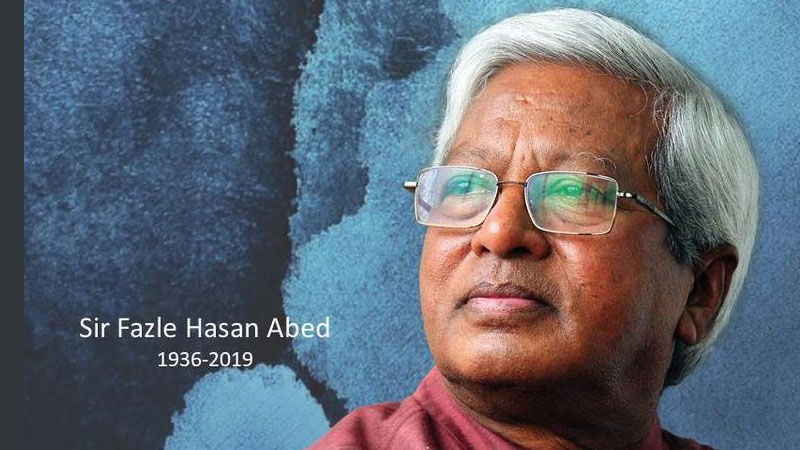
by Noore Alam 25 December 2019
Sir Fazle Hasan Abed, the founder and the Chair Emeritus of the world’s largest NGO, the Bangladesh Rural Advancement Committee (BRAC) passed away on 20 December 2019 at the age of 83 in his home country of Bangladesh. Sir Abed was born in 27 April, 1936 into the prestigious family in the eastern Sylhet Division of Bangladesh.
I knew Sir Abed (lovingly called as “Abed bhai” which literally means “brother Abed” in the NGO community in Bangladesh) since late 1980s during my early NGO career in Bangladesh. He was an extraordinary community leader with a zeal to service the humanity, a motivator and an inspirer for young people with a passion to serve those who need the most.
Sir Abed founded the Bangladesh Rehabilitation Assistance Committee (BRAC) in 1972 as a small refugee-rehabilitation project in post-war Bangladesh when some 10 million refugees who fled to India during the liberation war of Bangladesh (then “East Pakistan) with Pakistan started returning to their home country – the newly independent Bangladesh.

Educated in Dhaka, Bangladesh and at the University of Glasgow, Scotland, Abed trained as an accountant before returning to East Pakistan, now Bangladesh, to join the Shell oil company in late 1960s. in 1969, when a devastating cyclone hit the south of the country, killing 300,000 people, Abed quit corporate life to set up an organisation called HELP to provide assistance to the cyclone victims.
When the liberation war broke out in March 1971 in Bangladesh, Sir Abed moved to London where he established Action Bangladesh and campaigned for the support of the European governments to his country’s independence.
Returning to the newly independent Bangladesh in 1972, he found the country devastated, with few functioning schools, health facilities, and agricultural resources. Recognising the dire need for a strategic intervention, Abed used his influence and experience as the former Head of Finance at Shell to negotiate for financial support from Oxfam, based in London.
Over the past five decades, while the original acronym still remains, he mobilised and led a mammoth community development operation using a multi-dimensional approach to poverty alleviation under the name of Bangladesh Rural Advancement Committee (BRAC) which now operates in all 64 districts of Bangladesh through development interventions ranging from education, healthcare, microfinance, skills, human rights, agriculture to enterprise development. Having educated over seven million children who live in extreme poverty, BRAC has become one of the world’s most inspirational examples of how a non-profit establishment can exercise a transformative impact when rooted in strong community-based business practices.
Today, BRAC has an annual global budget exceeding $1 billion. It is now considered the largest non-profit organisation in the world – both by employees and people served. The organisation is also unique in that the majority of its programs are self-financed with more than 75 percent of its operational budget in Bangladesh coming from its own social enterprises.
Similar to many other NGOs in poverty-stricken countries, poverty alleviation is the cornerstone of BRAC’s agenda. However, it applies a unique model of businesslike approach to poverty alleviation initiatives. BRAC recognises that there are factors that cannot always be explained by economics as to why people are impoverished. BRAC addresses social issues and inequality by using its own funds to ensure its impacts are more sustainable. Abed believed that businesses could positively impact society. In an interview for the Creating Emerging Markets project at the Harvard Business School in 2014, he said, “I’ve never thought that you can do good only through non-profit activities. You can do good also by doing business.”
Thanks to his visionary leadership and a unique social development model tested for three decades, Sir Abed expanded BRAC to overseas in 2002 with its first operation in war-torn Afghanistan. Since then, he was able to build up massive operations in 11 countries in Asia and Africa, with offices in Britain, the United States and the Netherlands. Today BRAC’s programs encompass microfinance, education, healthcare, water and sanitation, legal rights, women’s’ empowerment, agriculture; and in Bangladesh, in addition to the above – socially responsible businesses, a bank, a university, and one of the world’s largest mobile money-transferring platforms – bKash.
Sir Abed was honoured with numerous national and international awards for his outstanding contributions in social development. He was the lone Bangladeshi (since the independence of Bangladesh) to be honoured with a knighthood by the British Crown in 2010. In 2019, he was honoured with the Officer in the Order of Orange-Nassau for his successful work in alleviating poverty, especially of women and children. He was also awarded as Outstanding Member of the South Asian Diaspora. Some of his other awards include World Food Prize (2015), Spanish Order of Civil Merit (2014), Leo Tolstoy International Gold Medal (2014), WISE Prize for Education (2011).
Sir Abed was listed in the Fortune Magazine’s World’s 50 Greatest Leaders in both 2014 and 2017. In August 2019, Sir Abed retired as the chairperson of BRAC Bangladesh and BRAC International, and took on the position of the Chair Emeritus.
Under his dynamic leadership and by the work of a strong, motivated team he mobilised, BRAC retained the top spot for the fourth consecutive year of the “Top 500 NGOs World Rankings” as the “global leader in developing cost-effective, evidence-based programmes in conflict-prone and post-disaster settings”. The ranking was awarded by NGO Advisor, an independent media organisation based in Geneva, Switzerland.
Ameerah Haq, the Chairwoman of BRAC’s Global Board, said Abed had “unfaltering dedication, focus and work ethic”. “He always put others before himself and let his work speak for itself,” she said in a statement.
Sir Abed’s achievements are outstanding and will continue to make an impact on the lives of many and he would remain alive in hearts and minds of millions of poor of the world that moved out of poverty because of him and his ideas.
Rest in Peace – Sir Fazle Hasan Abed!

Excellent piece of work by Noore Alam on Sir Fazley Hasan Abed!